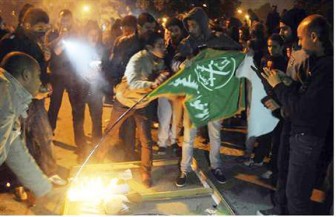CAIRO, (Reuters) – Egypt’s Islamist president, Mohamed Mursi, called yesterday for a national dialogue after deadly clashes around his palace, where demonstrators responded by demanding the “downfall of the regime”, using the chants that brought down Hosni Mubarak.
Mursi said in a televised speech that plans for a referendum on a new constitution on Dec. 15 were on track, proposing a meeting tomorrow with political leaders, “revolutionary youth” and legal figures to discuss the way forward after that.
The Republican Guard intervened yesterday to halt violence outside the palace, where seven people were killed overnight in clashes between supporters and opponents of Mursi.
Members of the main opposition coalition, the National Salvation Front, said they were assessing the offer of talks to end a crisis sparked by Mursi’s Nov. 22 decree awarding himself wide powers and protecting his decisions from judicial review.
The opposition has previously demanded that Mursi scrap his decree, postpone the referendum and redraft the constitution.
As well as drawing up a political roadmap, Mursi said the talks would aim to resolve the fate of the upper house of parliament after the Islamist-dominated lower house was dissolved in June, the election law and other issues.

“I call for a full, productive dialogue with all figures and heads of parties, revolutionary youth and senior legal figures to meet this Saturday,” Mursi declared, adding that the meeting would be at his official palace.
Several thousand opposition protesters near the palace waved their shoes in derision after his speech and shouted “Killer, killer” and “We won’t go, he will go” – another of the slogans used against Mubarak in last year’s revolt.
The Cairo headquarters of the Muslim Brotherhood, the group that propelled Mursi to victory in a June election, was set ablaze. Other offices of its political party were attacked.
This week’s violence reflects the widening rifts in the most populous Arab nation, where contrasting visions of Islamists and their liberal rivals have complicated a struggle to embed democracy after Mubarak’s 30 years of one-man rule.
TENTATIVE CONCESSION
The United States, worried about the stability of an Arab partner which has a peace deal with Israel and which receives $1.3 billion a year in U.S. military aid, had urged dialogue.
Mursi said he did not insist on keeping his actions shielded from legal challenge, adding that his entire decree would lapse after the constitutional referendum, regardless of its result.
He said a new constituent assembly would be formed to redraft the constitution if Egyptians rejected the one written in the past six months by an assembly dominated by Islamists.
The Republican Guard, an elite unit whose duties include protecting the presidential palace, had ordered rival demonstrators to leave by mid-afternoon. Mursi supporters withdrew, but opposition protesters remained, kept away by a barbed wire barricade guarded by tanks.
By evening their numbers had swelled to several thousand.




